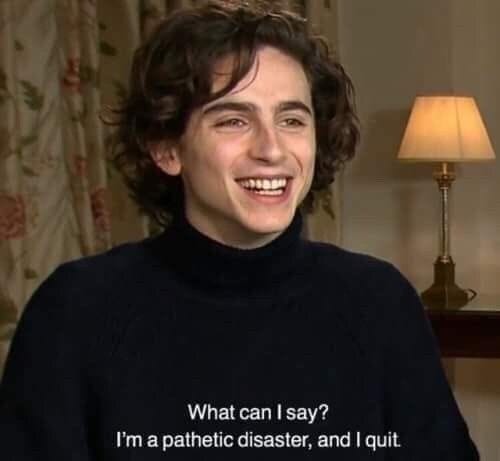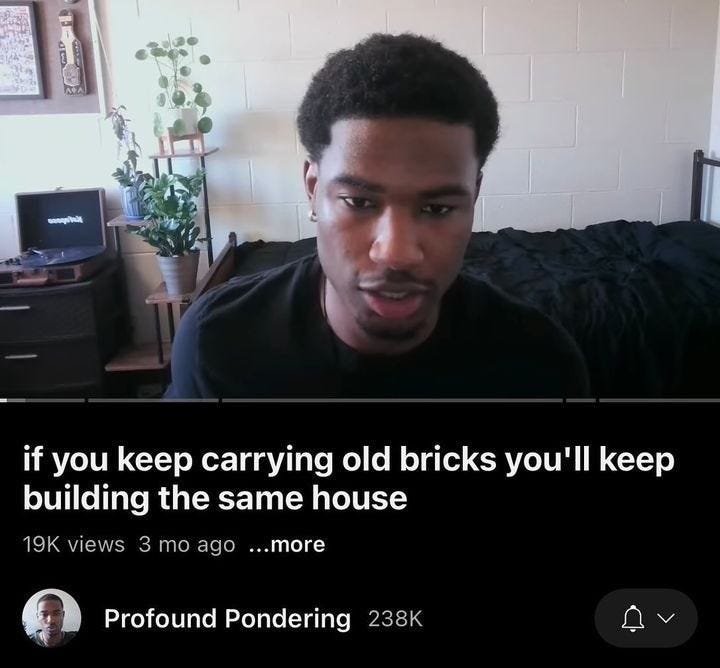The first time I ever remember quitting something was when I was 4 or 5. My dad had signed me up for co-ed t-ball, and after the first practice, I was out—with vehemence.
I was the only girl that showed up for practice, and I was painfully shy at that age. My dad tried to encourage me to give it another chance, but I had made up my mind.
Something in my little 5-year-old intuition told me that t-ball was not for me.
Since then, quitting things had become tied to my identity. Countless jobs started and quit within weeks, projects abandoned, and hobbies that burnt out with the same white-hot intensity that started them. In college, I transferred schools twice, changed majors four times, and even dropped out for a semester (and still graduated Cum Laude in four years).
Most recently, I quit the podcast. A three-year build-up, a bang, and a fizzle (more on that in a minute).
I quit things so much that I had to stop telling my family what I was doing. Every “What have you been up to?”, met with a shrug. Every time news leaked that I started and stopped yet another venture, I could feel the judgment and disappointment hang thick in the air.
There goes Erin, once so full of promise, squandering it with her inability to stick with anything for any meaningful amount of time.
For a long time, I thought the messy trajectory of my life was proof that I was a failure. A dud. Wasted potential. I thought I was too flighty, too picky, too idealistic.

But now, I’m not so sure.
Quitting or learning?
You know how in Wicked (of course you do) how Elphaba dreamed and worked toward this one thing—meeting and working alongside the Wizard, the paragon of success—and when she got there it wasn’t at all what she thought it would be?
That’s what the podcast was like.
It was something I dreamed about and wanted for so long, and when I finally started, it only took me three episodes to totally burn out.
When the idea of wanting to start a podcast came into my mind three years ago, I couldn’t let it go. It felt like THEE thing I was meant to do.
Unbeknownst to me, it was an idea born from a time when I didn’t know myself well at all. And when you don’t know yourself, you have all sorts of ideas about what you could and should do because you’re absorbing and projecting the things you see people you admire (and probably envy) doing. You want what they have in some capacity, and you think that all you need to do is follow the exact road map they took to get it (attention, praise, money, power, etc.).
But the problem, rather obviously in hindsight, is that they are not you. The context of who they are and what stars aligned to get them to your perception of them is not replicable.
What is aligned and makes sense for someone else literally can’t be aligned and make sense for you.
When this journey started, I didn’t know an outlet for writing existed. I didn’t know there was a platform where I could use my gifts to share my ideas. I was too caught up in what everyone else was doing to even remember what my gifts were in the first place.
And as I got further and further along in my journey, I re-remembered that I was a writer. Writing is my art of choice—the way I express myself. Then a little over a year ago, I found Substack. And (probably) like you, I love it here. I could give two shits whether or not the things I write get 2 likes or 1,000, I simply love the act of creating and sharing essays here (as a side note, I think the proof is in the pudding. Taking aligned action and honoring my gifts has led to effortless growth on this platform. Just proof that the energy behind an action is more important than the action itself).
Even still, the desire to start a podcast remained. I thought I was a sign that it was the next thing I was meant to do. But, as it turned out, it was just a relic of a time and a version of myself that was no longer present. Unable to let go of it, not wanting to admit I was quitting yet another dream, I persisted.
When I did start the podcast, it was turmoil from the start. The time and energy of trying to book guests, researching, recording, and editing was taking over my life. But most importantly, it took away from the time I normally spent writing, and that just made me downright sad. In just a few weeks, I had quickly come to resent the podcast.
That’s when the realization hit me—writing had filled the creative void that I thought the podcast would.
Letting go of old dreams isn’t a simple or straightforward process. We want to craft a consistent narrative of our identities, both for ourselves and in the version of ourselves we present to others. This includes the things we say we want and we’re going to do.
How often do we cling to things to keep the story straight, even when we’ve learned new information that changes the context of the story entirely?
Learning new information and changing your mind is not flighty, it’s growth.
If Elphaba had just stuck with the Wizard, letting the need to gain his approval and the embarrassment of admitting she had been wrong about what she wanted to take over, she would have ended up compromising her core values.
But I feel like that’s the story that so many people end up living out—refusing to course-correct, keeping their blinders on, and just going along with decisions made by earlier versions of themselves because it’s easier than admitting they didn’t have the whole picture, or that they were wrong.
At least I tried
God forbid anyone sees you try something.
Is everyone just moving through life continually doing things they hate?
Honestly, probably.

We all have beliefs and ideas about who we are and what life on Earth looks like, and we will continually act in accordance with those beliefs until those beliefs change. But most people never change their beliefs because, 1) most people don’t know that their version of reality is entirely subjective and can change literally whenever they want, and 2) change is confronting and wildly uncomfortable.
When we start to change our beliefs, there’s a potential that we might alienate ourselves. We might have to grapple with the fact that everything we thought was true was just smoke and mirrors. It’s hard to stomach.
Humans prefer what’s comfortable to what’s true 9 times out of 10. There’s safety and certainty in the congenial and familiar. Comfort and safety is what we’re so expertly adapted to do. At times, to our detriment.
But the willingness to be wrong may be your key to freedom.
It was hard to admit that something that had occupied so much of my waking thoughts for literally years wasn’t for me. But every time you try and quit, “fail”, or learn you were wrong, you learn something about yourself.
I’ve learned that quitting things isn’t (always) me being “a quitter”, it’s an act of learning to listen to my intuition.
I’ve surely quit things I shouldn’t have, and I’ve definitely stuck with things I should’ve quit. It’s all part of recalibrating the intuitive barometer.
So many people are afraid to listen to their intuition. We try to use logic to override it.
Maybe it seems silly, but I think my intuition when I was 5 was stronger than it is now. No comparison, no ideas of what I should or shouldn’t be or like. Just the raw materials.
As much as my parents tried to guide me into sports, I was more inclined to the arts. I wanted to create things and express myself. I wanted to dance and take painting classes and learn how to sculpt with clay. I wanted to follow my curiosity. When I was 5, I knew this. But when the culture you’re in repeatedly asks you, “Are you sure?”, you start to second guess yourself. These are the first instances of separation from our intuition, and from that moment on, you begin the long, winding journey back to find it.
I’m finding my way back now.
—
The podcast did serve a very important purpose that shouldn’t be minimized. It showed me a damaging behavior loop I was repeating that kept me in purgatory for years. In simply starting it, I overcame 3 years of being stuck in the inertia of motion and moving into action. The podcast was an important container for growth and transformation that truly changed my life. Starting (and quitting) it became a lifeline I didn’t know I needed.
You have to let yourself quit things. Not everything—it’s important to have awareness of why you’re quitting things—but quitting is proof that you’re trying; that you’re learning. Trying things on and seeing how they feel is the fastest way to know what’s for you and what’s not. You’ll never know what might light your soul up if you don’t dip your toe in the water. It’s the quintessential premise behind “fuck around and find out”. And if you learn things aren’t what you thought they would be?
Quit.
Want to support my work but don’t want yet another subscription? I get it.





Here’s to lifelong learning and making fools of ourselves while doing it! You’re right, there’s vulnerability and risk in taking on new projects/goals/hobbies that perhaps makes most of us feel more comfortable “playing not to lose” i.e. not starting in the first place. “Playing to win”, on the other hand, inevitably comes with some losses (and quitting) along the way, but will pay out big in the end. I’m excited to read whatever it is that quitting the podcast now creates space for you in the future!
This is a relevant article timing wise for me, I have struggled over the past year with picking up projects/ideas and "quitting" them, or putting them down for sometime with the idea of coming back later only to not do it or do it after an uncomfortable amount of time has passed. Like you, there are so many interests I have that burn out quickly and I usually try to explore all of them so I can see if it works or sticks. Sometimes I feel like this need to try all things interferes with doing one thing consistently and well. I'm trying to get to a place where I'm more consistent on one or two things I really desire and enjoy while also being forgiving of myself for the missteps along the way.